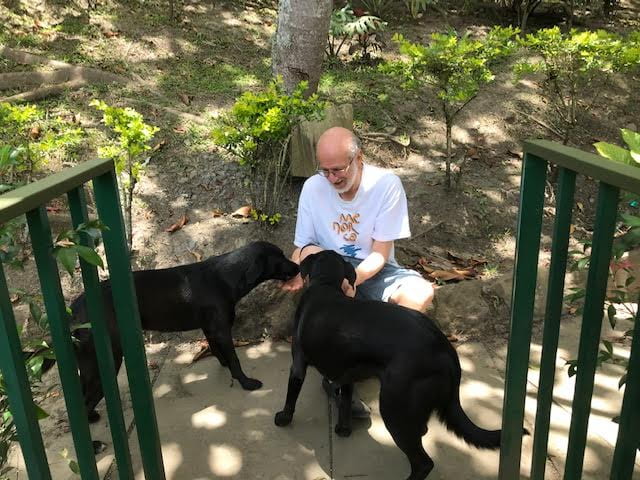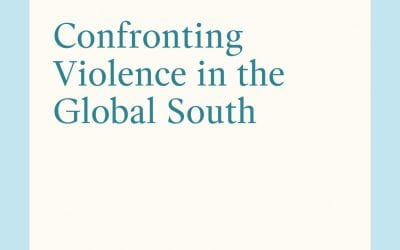Echoes of Noah’s Ark
There’s never been an oceanic trip in the history of the world more terrible than that of the patriarch Noah. Not even the Titanic. Can you imagine what those forty days and forty nights were like aboard a creaky boat in the company of the most crowded possible zoo? Can you even think about the dangers of contagion and poisoning posed by these insects and reptiles? Or the debris left by elephants, rhinoceros and hippos that virtually covered the floor like a rug? The erotic adventures of macaques and porcupines? The fights between wolves and tigers, who were at each other like dogs and cats? And the worst of all: the cacophony of noises these creatures emitted during the endless five and a half weeks they floated in the waters of universal flooding.
I suppose that while the cats hissed, scared by the barking dogs, the wolves howled in response to the terrifying tigers’ roar. The sheep, nervous about feline presence baahed and baahed and baahed; the very scared hare whined; the deer bellowed and the hyenas, who complained about everything, brayed and brayed and brayed.
The concert began early in the morning with school-age animals and their characteristic noises. In the kids’ corner, the piggies came to oink, the calves to bleat, the lambs to bleat, the chickens to chirp and the capybara pups to chatter.
And around 10 each morning, the talkative birds celebrate their daily gossip fest. The parrots squawk; the parakeets chirp; the cockatoos screech and the macaws scream. Distraught with the commotion, the elephants flap their large ears and trumpet over and over again to demand silence. Cowardly and disrespectful, the monkeys howl and do monkey stuff, which is what one would expect from a monkey.
Deep was the bellowing of the oxen, deep the rumbling of the bison and the whinny of the zebras, but even deeper the snoring of the camels and, now that we’re in depth of deepness, the whales’ song is deeper than anything else. From the stables, the mares panted; from its nest, the hens cackled; from the highest pole, the storks clattered their bills; from the garden, the bees buzzed; from the blue pool, the swan honked and from just about every corner, one could hear the donkeys’ choppy brays.
In the midday heat, the crickets erupted into their incessant chirping, to which the cicadas responded by rubbing their legs together in a shrilling outburst. The quails joined in with a high-pitched cackle. The larks with their trills invited the crow to croak; the cranes honked, the swallows twittered and the sky filled with the loud din of birdsong; the relentless parroting of the parrots; the cooing of the doves; the peeps of the pigeons; the chirrups of the sparrows; the chattering of the magpies and the chirping of the little birds. The winged creatures were having a blast. Nothing like a duck to quack, like a peacock to shriek, like a turkey to gurgle, like a partridge to cluck, chatter and mock. Nothing like a penguin to applaud. Nothing like a serpent to whistle.
At dusk, the sound of forest animals took over. The leopards roared, the owl hooted; the wild pigs grunted, the bears growled, the bucks groaned, the coyotes snarled, the frogs croaked and the foxes yelped.
But the dawn concert was yet to take place, and Noah and his family had already listened to the racket forty times. Howling, buzzing, mooing, bawling, bellowing, roaring, trumpeting, bleating, grunting, twittering and snorting blended together in an indiscriminate choir. And then there was the voice of the patriarch who, accompanied by a giraffe (the only animal that does not make any sound), cried to the heavens:
—”Dear Lord, put an end to this, according to Thy will: order the rain to stop, let us get off the boat and, above all, shut up these beasts!”
God finally took pity on the loyal old man. When the huge ship ran aground at Mount Ararat, and all the animal species were saved—including the humans—Noah could finally set foot on land. They say he took the cotton out of his ears and founded the first translation academy ever (to put names on the sounds he had heard) and drank a barrel of wine. Who could blame him?

Ecos del arca de Noe
Por Daniel Samper P.
Seguramente no ha habido en la historia del mundo un viaje oceánico más terrible que el del patriarca Noe. Ni siquiera el del Titanic. ¿Imaginan ustedes lo que fueron esas cuarenta noches con sus cuarentas días a bordo del crujiente buque y en compañía del más abarrotado zoológico concebible? ¿Conciben los peligros de contagio y veneno que ofrecían insectos y reptiles? ¿Los detritos de elefantes, rinocerontes e hipopótamos que alfombraban el piso? ¿Las aventuras eróticas de macacos y puercoespines? ¿Las peleas entre lobos y tigres, que se llevaban como perros y gatos? Y lo peor de todo: ¿la cacofonía de ruidos que emitían estas criaturas durante las interminables cinco semanas y media que flotaron en aguas del diluvio universal?
Supongo que mientras el gato fufaba asustado por los ladridos del perro, otilaba el lobo ante el aterrador rugido del tigre. La oveja, inquieta por la felina presencia, balaba, balaba y balaba; chillaba la liebre asustadiza, el ciervo bramaba, y la hiena, que se queja por todo, gruñía, gruñía y gruñía.
El concierto empezaba temprano en la mañana con los animales en edad escolar y sus ruidos característicos. En la zona infantil del arca se reunía el lechón, para churritar; el ternero, para berrear; el borrego, para gamitar; el pollo, para el pío-pío; y el bebé chigüiro para guañir.
A eso de las diez, las aves parlanchinas celebraban su tertulia diaria. La lora parlaba, gorjeaba el perico, gañía la cacatúa y garraba la guacamaya. Desesperado por el comadreo, el elefante movía las orejotas y barritaba reiteradamente para exigir silencio. Cobarde e irrespetuoso, el mono chillaba y hacía monerías, que es lo que se espera de un mono.
Hondo era el remudio del buey, hondo el bramido del bisonte y hondo el relincho de la cebra, pero más hondo roncaba el camello y, ya metidos en honduras, el canto de la ballena se imponía sobre los demás. Desde las caballerizas resoplaba la yegua, desde el nidal cacareaba la gallina, desde lo más alto del palo mayor crotoreaba la cigüeña, desde el jardín zumbaba la abeja, desde el estanque azul voznaba el cisne y desde cualquier esquina dejaba oír su entrecortado rebuzno el burro.
Con el calor del mediodía estallaban los chirridos del grillo, a los que respondía la cigarra estridulando y, ajeando, la codorniz. La alondra invitaba con sus trinos al cuervo para que crascitara; gruía la grulla, trisaba la golondrina y el cielo se llenaba del estrépito canoro de las aves: el implacable cotorreo de la cotorra, el arrullo de la paloma, el zureo del palomo, el gorgoriteo del gorrión, el grajeo de la urraca y el piar de los pequeños pájaros. Era la fiesta de los alados. Ninguno como el pato para parpar, como el pavo real para chillar, como el guajolote o pavo americano para gluglutear, como la perdiz para piñonear, castañetear y titear. Ninguno como el pingüino para aplaudir. Ninguna como la serpiente para silbar.
Al caer la tarde reinaban los ruidos de los animales del bosque. Himplaba el leopardo, ululaba el búho, chiflaba la lechuza, arruaba el jabalí, gruñía el oso, roncaba el gamo, guarreaba el coyote, la rana croaba y tauteaba el zorro.
Pero aún faltaba el concierto de madrugada, que Noé y su familia escucharon cuarenta veces. Era un orfeón promiscuo donde se mezclaban aullidos, zumbidos, mugidos, berreos, rugidos, bramidos, chillidos, balidos, gruñidos, trinos, bufidos y la voz del patriarca que, caballero en una jirafa (el único animal que no emite sonido alguno), así clamaba al cielo:
–¡No más, Señor, por lo que más quieras: ordena que la lluvia cese, permítenos desembarcar y, sobre todo, calla a estas bestias!
Dios se apiadó finalmente del fiel anciano. Cuando la colosal embarcación encalló en el monte Ararat y se salvaron todas las especies animales, incluso el hombre, Noe pudo pisar tierra firme. Dicen que se quitó los algodones de los oídos, fundó la primera academia de traducción de lenguas (para nombrar los sonidos que había oído) y se bebió un barril de vino. ¿Quién podría reprochárselo?

Daniel Samper P. is a member of the Royal Academy of the Spanish Language. He is a columnist for the website losdanieles.com, one of the most influential in Colombia. He was the first Latin American to become a Nieman Fellow (1980-1981) at Harvard. He worked for El Tiempo (Colombia) and Cambio 16 (Spain) and has lived in both countries. He is the recipient of the Maria Moors Cabot, King of Spain and Simón Bolívar Awards, among others. Samper is author of more than 35 books and has written popular television comedies.
Daniel Samper P. fue el primer latinoamericano que ingresó al programa Nieman Fellows (1980-1981) en Harvard. Trabajó en El Tiempo (Colombia) y Cambio 16 (España) y ha vivido en los dos países. Es ganador, entre otros, de los premios Maria Moors Cabot, Rey de España y Simón Bolívar. Samper es autor de más de 35 libros y varias comedias para televisión. Es miembro de la Academia de la Lengua. Es columnista del portal losdanieles.com, uno de los más influyentes de Colombia.
Related Articles
Editor’s Letter – Animals
Editor's LetterANIMALS! From the rainforests of Brazil to the crowded streets of Mexico City, animals are integral to life in Latin America and the Caribbean. During the height of the Covid-19 pandemic lockdowns, people throughout the region turned to pets for...
Where the Wild Things Aren’t Species Loss and Capitalisms in Latin America Since 1800
Five mass extinction events and several smaller crises have taken place throughout the 600 million years that complex life has existed on earth.
A Review of Memory Art in the Contemporary World: Confronting Violence in the Global South by Andreas Huyssen
I live in a country where the past is part of the present. Not only because films such as “Argentina 1985,” now nominated for an Oscar for best foreign film, recall the trial of the military juntas…



